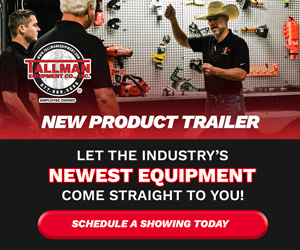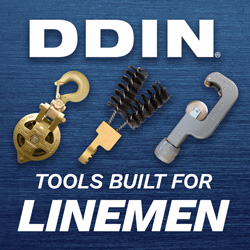When storms roll in and the power goes out, the utility bucket truck serves as a mobile office for linemen. The tools and equipment on the truck need to be sufficient to effectively complete the job while also keeping the linemen safe from injury and shock. Given the wide variety of situations that can arise in the field, the inventory on the typical utility truck needs to be applicable to as many potential scenarios as possible, but it also cannot be so extensive that it does not all fit. Choices need to be made to ensure the best possible balance of practicality and space consumption.
Many items in a properly stocked bucket truck will be obvious to a lineman. Hot sticks, wrenches, Kleins, and impacts are all standard fair when it comes to lineman tools, but sometimes the tools needed are not as obvious but just as necessary. Battery tools are useless if the batteries are not charged. Bucket trucks are great, but there are times the bucket cannot reach.
Obviously, there are a great many things to consider when it comes to managing the inventory on a bucket truck, but here are some ideas to get started.
Gloves Testers
It isn’t news to linemen that they need rubber gloves or that their rubber gloves need periodic testing and daily inspection, but when stocking a bucket truck, it can be easy to overlook that daily inspection process. Fortunately, the F.A.I.T. (Field Air Inspection Tool) is a daily glove tester that fits into any glove bag, and provides a quick and simple method for performing an air leak test on rubber insulating gloves. The tool acts as a clamp that securely pinches off the open end of rubber gloves and creates a better seal when rolling up the gloves to test for punctures.
Ground Sets
A key safety tool in the lineman’s arsenal is the ground set. Being able to redirect unexpected current to the ground instead of electrifying the what was supposed to be de-energized is a crucial layer in lineman protection. Ground sets need to be in good repair and periodically inspected, cleaned, and tested to ensure that the dielectric properties are still intact. Tallman Equipment builds ground sets to order and can clean and refurbish ground sets back to like new condition, complete with dielectric testing.
Battery Chargers

Battery powered lineman tools have revolutionized the industry. Whether it’s cutters or crimper, impacts or staplers, the ability to be cord free is a quantum leap forward in efficiency. Freedom from hydraulic hoses and power units feels like being escaping a ball and chain, but there is a downside. Those batteries still need to be charged. Whether your truck is carrying Makita or Milwaukee tools, it will need a way to keep them charged.
Lights

Unfortunately, power outages don’t always happen during daylight hours, and utility customers tend to insist that they still need power at night. Fortunately, there are numerous ways to bring light to the darkness. Hard hat lights should be a no-brainer to keep accessible on a utility truck. They take up minimal space and offer a simple solution to bringing light to the task at hand. Other jobs may call for search lights or area lights. They take up more space than a headlamp, but they offer additional brightness and area lighting capabilities.
Chainsaws
Oftentimes, those late night calls that the power is out are prompted by branches (or whole trees) that have taken out power lines. In those instances, restoring power means removing the obstructions first. Fortunately, Makita and Milwaukee both offer a selection of chainsaws that work with their battery platforms. Whether the best option is a heavy duty chainsaw, a lighter top handle chainsaw, or a pole saw for extended reach, it is a good idea to have something on hand to be able to dispatch with trees and branches (and don’t forget the safety wear, like chaps or a face shield, to go with it).
Climbers
The beauty of a bucket truck is in the ability for the boom is bring the linemen to his work, but occasionally, this is not a feasible option. In those instances, the lineman needs to be able to resort to old school linework: climbing a pole. Having a trusted set of hooks, a climbing belt, and a wood pole fall restraint system available means that even when the bucket truck doesn’t have access, the lineman can still get to his work.
Voltage Detectors
It goes without saying that linemen are constantly exposed to high voltage situations, and perhaps the most important thing a lineman can know at any given time is whether or not there is current flowing. This is where voltage detectors come into play. Whether it is a personal voltage detector that can attach to the brim of a hat or be worn on the body to alert the user of proximity to live current or it is a Multi-Range Voltage Detector to test lines before servicing, knowing whether or not there is voltage is crucial for linemen do safely do their jobs.
First aid kit
Sometimes things do not go quite as planned and minor injuries can happen. A fully equipped truck should always have a first aid kit readily accessible for those instances. Whether the issue is a cut or a scrape or a splinter, having the appropriate tools to deal with it is just as important as having the right tools to repair a downed line.
Like the Boy Scouts say, “Be Prepared” and Trust Tallman
This is by no means an exhaustive list of things that should be on a utility bucket truck, but these are things that should not be forgotten. Keep you and your crew equipped for whatever the job throws at you by being proactive in keeping your utility truck stocked with both the obvious and not so obvious tools and gear that will allow you to get the job done.
For over 70 years, Tallman Equipment has been supplying the utility industry with the best tools and equipment for linemen, and our tool experts have years of experience and can help you find the right equipment for your job.
For more about Tallman Equipment, read up on The 1952 Society here, learn more about Tallman’s history, and check out how our rental department can help you.



















0 Comments